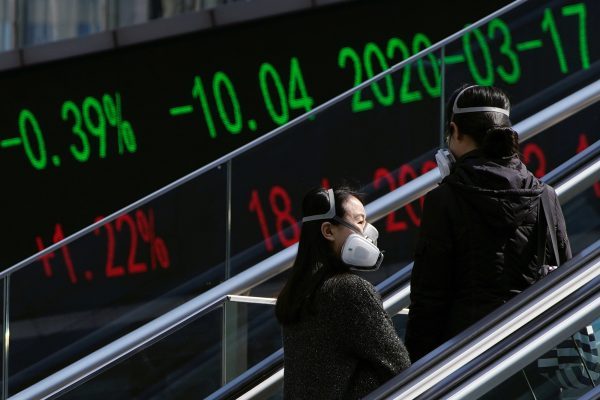A global emergency demands a global solution

The rapidly escalating coronavirus pandemic is, first and foremost, a public health emergency. But as the virus spreads and governments take dramatic actions to curb the disease, it is also rapidly causing a global economic crisis.
A prolonged outbreak — with reduced demand, disturbed supply chains and increasing uncertainty — could lead to widespread job losses and businesses closing down and cause other second-order economic effects. The pandemic has undoubtedly become the greatest health and economic crisis in modern times.
The economic impact of the disease will importantly depend on how successfully societies can collectively contain transmission by drastically pruning contact networks. Absent swift and effective action, the number of deaths and infections will grow dramatically, health systems will become overwhelmed, businesses will struggle to function and the global economy will suffer major consequences.
Given the tight correlation between economic performance and health (life expectancy), the more the economy suffers, the worse the long-term health impacts will be.
While governments are taking increasingly drastic domestic measures, they must also not neglect the international dimension. If the rapid spread of coronavirus makes one thing clear, it is that what happens abroad can have major impacts at home.
Australia’s economic fortunes, for example, are not only contingent on how the virus spreads locally but also on how our major trading partners and the global economy fare. And in our hyperconnected world this is true for every country: all have a major stake in effective health and economic measures taken in other countries and cooperation that makes that possible.
In this context, the leaders of G20 countries should urgently agree on a comprehensive global action plan to address the COVID-19 outbreak.
While the G7 is convening an emergency video conference meeting to discuss a coordinated response, the G20 must be the primary convener for a truly global response given its global authority, more inclusive membership (comprising both the major advanced as well as the major emerging economies) and, what’s more, its successful role in managing the Global Financial Crisis.
Australia, as a key driver for the establishment of the G20, has special responsibility to argue for G20 action now. That action should include both collective interventions to enhance the global response to stem the spread of coronavirus and coordinate action to restore stability in the global economy.
The G20 has the opportunity and the obligation to step up to provide the global leadership we require to confront a virus that knows no borders but is causing a loss of confidence and increased volatility in global markets.
Just as they did in 2009 in response to the global financial crisis, G20 leaders must take swift and decisive action to help reassure global business, markets and citizens throughout the world in the face of growing uncertainty and major potential economic disruption.
There has been very little coordination or cooperation between countries so far. Bilateral initiatives, such as China’s shipping respirators to Italy, now the outbreak is abating at home, help save lives. But more can be done together.
Difficult action at home is made easier when done with others through global cooperation. Instead, knee-jerk responses, including those that stigmatise ethnic groups and the elderly, make it harder for other countries to respond to the crisis.
An initial priority must be for G20 leaders to agree on coordinated action to ensure access to essential medical supplies everywhere in the world. This must involve at least three core elements. First, leaders must reverse and commit to avoid export bans or limits on the free flow of all necessary medical supplies, medicines, disinfectant, soap and personal protective equipment.
In a global pandemic, we need to ensure essential supplies are available where they are needed most. Resorting to ‘beggar-thy-neighbour’ policies during a global health crisis inflicts much more than economic pain on other countries, and ultimately would be a self-inflicting wound.
Second, national leaders must reduce the costs of necessary medical supplies. This can be achieved by lifting import taxes, quotas and other government-imposed costs.
And third, governments must commit to scale public health financing to tackle coronavirus in the poorest countries in the world least able to cope — whether through increasing aid funding for public health or encouraging business, philanthropic and individual contributions to the World Health Organisation’s COVID-19 Solidarity Response Fund.
While governments must — absolutely — prioritise protecting their own citizens, world leaders must come together and pledge to do whatever is necessary to keep the world economy out of recession and to restore confidence, growth and jobs.
A unified signal from world leaders that they will provide coordinated support for affected sectors and small businesses would allay uncertainties, build confidence and do much to keep the economy functioning at a critical time.
Alignment among G20 leaders on such a package of measures would significantly boost ongoing efforts to manage the pandemic — while minimising the potential social and economic impacts of COVID-19. Australia has the opportunity and responsibility, with others, to lead.
Dealing with the crisis alone incurs only deeper health and economic costs. Tackling a crisis that knows no borders demands a truly global response. The most effective and legitimate way to do that is through the G20: our leaders must step up without delay.
This article was written by John WH Denton AO, the Secretary General of the International Chamber of Commerce (ICC) in Paris and Peter Drysdale AO, the Emeritus Professor and Head of the East Asian Bureau of Economic Research in the Crawford School of Public Policy at The Australian National University. The article was published by the East Asia Forum. Another version of this article originally appears in The Australian Financial Review.
Peter Drysdale is Head of the Asian Bureau of Economic Research and Editor-in-Chief of East Asia Forum in the Crawford School of Public Policy at The Australian National University. He co-authored the Australia–China Joint Economic Report in 2016 and a new report on Getting the Australia–China Relationship Right.












